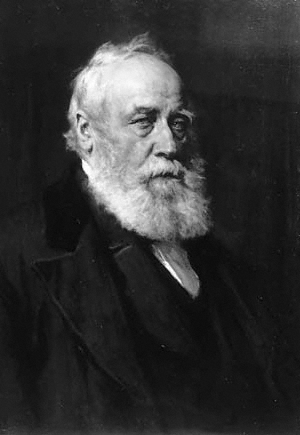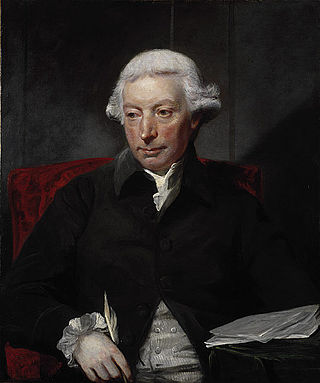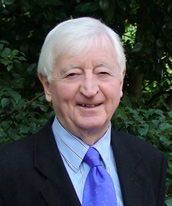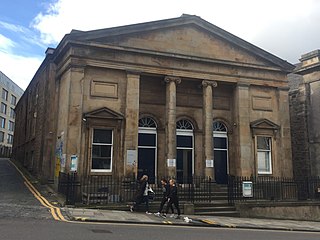Related Research Articles

The Highlands is a historical region of Scotland. Culturally, the Highlands and the Lowlands diverged from the Late Middle Ages into the modern period, when Lowland Scots language replaced Scottish Gaelic throughout most of the Lowlands. The term is also used for the area north and west of the Highland Boundary Fault, although the exact boundaries are not clearly defined, particularly to the east. The Great Glen divides the Grampian Mountains to the southeast from the Northwest Highlands. The Scottish Gaelic name of A' Ghàidhealtachd literally means "the place of the Gaels" and traditionally, from a Gaelic-speaking point of view, includes both the Western Isles and the Highlands.

The Scottish Enlightenment was the period in 18th- and early-19th-century Scotland characterised by an outpouring of intellectual and scientific accomplishments. By the eighteenth century, Scotland had a network of parish schools in the Scottish Lowlands and five universities. The Enlightenment culture was based on close readings of new books, and intense discussions which took place daily at such intellectual gathering places in Edinburgh as The Select Society and, later, The Poker Club, as well as within Scotland's ancient universities.

William Forbes Skene WS FRSE FSA(Scot) DCL LLD, was a Scottish lawyer, historian and antiquary.

Adam Ferguson,, also known as Ferguson of Raith, was a Scottish philosopher and historian of the Scottish Enlightenment.

The Gàidhealtachd usually refers to the Highlands and Islands of Scotland and especially the Scottish Gaelic-speaking culture of the area. The similar Irish language word Gaeltacht refers, however, solely to Irish-speaking areas.

Alexander Keith Johnston FRSE FRGS FGS FEGS LLD was a Scottish geographer and cartographer.

Sir Robert Sibbald was a Scottish physician and antiquary.
Sir Frank Fraser Darling FRSE was an English ecologist, ornithologist, farmer, conservationist and author, who is strongly associated with the highlands and islands of Scotland. He gives his name to the Fraser Darling effect.

David Noel Livingstone is a Northern Ireland-born geographer, historian, and academic. He is Professor of Geography and Intellectual History at Queen's University Belfast.

The Royal Scottish Geographical Society (RSGS) is an educational charity based in Perth, Scotland founded in 1884. The purpose of the society is to advance the subject of geography worldwide, inspire people to learn more about the world around them, and provide a source of reliable and impartial geographical information.

Denis Edmund Cosgrove was a British cultural geographer. He taught at Oxford Polytechnic, Loughborough University, Royal Holloway, University of London, where he rose to become dean of the graduate school, and finally at the University of California, Los Angeles. In 1998, he received the prestigious Back Award from the Royal Geographical Society.
Scottish Gaelic literature refers to literary works composed in the Scottish Gaelic language, which is, like Irish and Manx, a member of the Goidelic branch of Celtic languages. Gaelic literature was also composed in Gàidhealtachd communities throughout the global Scottish diaspora where the language has been and is still spoken.

Romanticism in Scotland was an artistic, literary and intellectual movement that developed between the late eighteenth and the early nineteenth centuries. It was part of the wider European Romantic movement, which was partly a reaction against the Age of Enlightenment, emphasising individual, national and emotional responses, moving beyond Renaissance and Classicist models, particularly into nostalgia for the Middle Ages. The concept of a separate national Scottish Romanticism was first articulated by the critics Ian Duncan and Murray Pittock in the Scottish Romanticism in World Literatures Conference held at UC Berkeley in 2006 and in the latter's Scottish and Irish Romanticism (2008), which argued for a national Romanticism based on the concepts of a distinct national public sphere and differentiated inflection of literary genres; the use of Scots language; the creation of a heroic national history through an Ossianic or Scottian 'taxonomy of glory' and the performance of a distinct national self in diaspora.

Scottish literature in the nineteenth century includes all written and published works in Scotland or by Scottish writers in the period. It includes literature written in English, Scottish Gaelic and Scots in forms including poetry, novels, drama and the short story.

Andrew Hook, FBA, FRSE, is Emeritus Bradley Professor of English Literature at the University of Glasgow.
John Terry Coppock CBE FBA FRSE was a British geographer who was the Ogilvie Professor of Human Geography at University of Edinburgh from 1966 to 1986 and Secretary and Treasurer of the Carnegie Trust for the Universities of Scotland from 1986 to 2000. He was a pioneer in three areas of scholarship – agricultural geography, land-use management and computer applications.

Scottish Gaelic, is a Celtic language native to Scotland. A member of the Goidelic branch of the Celtic languages, Scottish Gaelic, like Modern Irish and Manx, developed out of Middle Irish. Most of modern Scotland was once Gaelic-speaking, as evidenced especially by Gaelic-language placenames.
Andrew Charles O'Dell FRSE FRGS FRSGS (1909–1966) was a Scottish geographer and antiquarian. A keen railway enthusiast he left a large collection of railway memorabilia to Aberdeen University, known as the O'Dell Collection. He was joint founder of the Institute of British Geographers in 1933.
Alan Grant Ogilvie OBE FRSE FRSGS was a Scottish geographer after whom the University of Edinburgh's Ogilvie Chair in Human Geography is named. He was President of the Royal Scottish Geographical Society from 1946 to 1950 and President of the Institute of British Geographers from 1951 to 1952.

St Oran's Church was a Gaelic-speaking congregation of the Church of Scotland in Edinburgh. Originating in the early 18th-century, the congregation continued until 1948, latterly meeting at Broughton Street.
References
- 1 2 "Withers, Prof. Charles William John". Who's Who 2019 . Oxford University Press. 1 December 2018. doi:10.1093/ww/9780199540884.013.U151526. ISBN 978-0-19-954088-4 . Retrieved 30 August 2019.
- ↑ WITHERS, Prof. Charles William John, Who's Who 2014, A & C Black, 2014; online edn, Oxford University Press, 20146
- ↑ "Professor Charles W. J. Withers". The University of Edinburgh. Retrieved 30 August 2019.
- ↑ "New Scots Geographer Royal appointed". BBC News. 15 September 2015. Retrieved 30 August 2019.